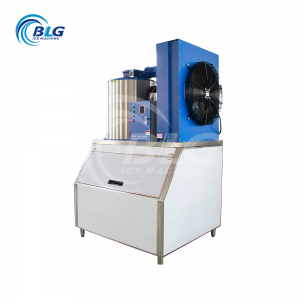Choosing the right flake ice machine is crucial for the food, fishing and healthcare industries, as well as a variety of other commercial applications. The selection process involves considering several key factors to ensure the machine meets specific production needs and operating requirements.
First, it is crucial to evaluate the intended application of the flake ice machine. Different industries have different needs for ice production, whether to preserve perishable goods, maintain product freshness or provide therapeutic cooling. Understanding the specific requirements of the intended use case is critical to selecting a machine that can deliver the necessary ice production and quality.
Another key consideration is the capacity and size of the flake ice machine. Businesses should evaluate their daily ice production needs and available installation space. Whether it's a compact undercounter unit for a restaurant or a large industrial machine for a fishing industry, the capacity and physical dimensions of the ice machine should match operating space and throughput requirements.
In addition, the energy efficiency and environmental impact of flake ice machines cannot be ignored. Choosing machines with high energy efficiency ratings can save costs and reduce your environmental footprint in the long run. Additionally, considering a machine’s water consumption and refrigerant type can help achieve sustainable and responsible operating practices.
Reliability, ease of maintenance and after-sales support are also important factors to consider when choosing a flake ice machine. Choosing a reputable manufacturer with a track record of producing reliable, durable equipment can ensure long-term performance and minimize downtime. In addition, assessing the availability of maintenance services and spare parts can help improve the overall operating efficiency and service life of the machine.
In summary, choosing the right flake ice machine requires a comprehensive evaluation of production needs, space constraints, energy efficiency, and reliability. By carefully evaluating these factors and working with a trusted supplier, businesses can make informed decisions that align with their operational requirements and contribute to efficient and sustainable ice production.

Post time: Aug-16-2024
BLG.png)





